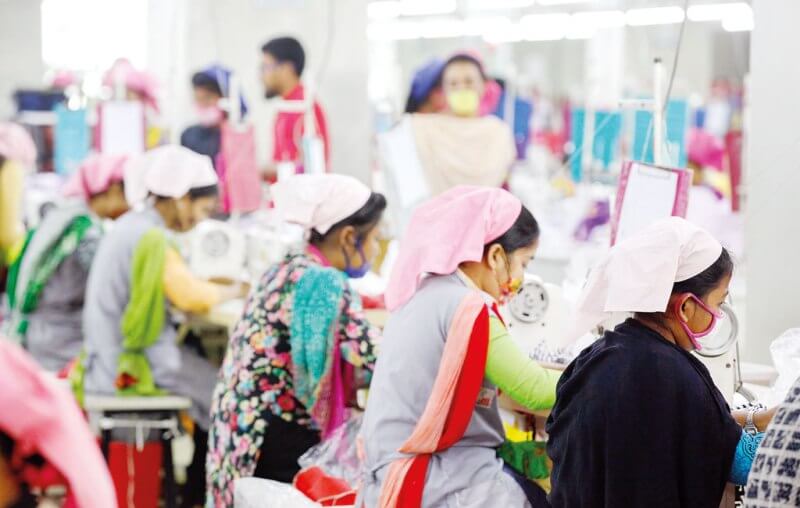Enamul Hafiz Latifee compiles,
A section of owners yesterday, 26 April 2020 reopened their garment factories with a part of their workforce amid continued protests in different districts demanding arrears.
At least 1,427 out of 7,602 export-oriented factories have reopened, industrial police officials said.
The move comes although there is no sign that the coronavirus outbreak has been contained.
Bangladesh Garment Manufacturers and Exporters Association had earlier issued a timetable for reopening the factories and guidelines on maintaining social distance inside the facilities.
Some 227 factories were open on the outskirts of Dhaka, 438 in Gazipur, 412 in Chattogram, 193 in Narayanganj, 75 in Mymensingh and 82 in Khulna, according to industrial police.Of these factories, 480 are members of the BGMEA, 121 BKMEA, 58 Bangladesh Textile Mills Association (BTMA), and 198 under Bangladesh Export Processing Zones Authority. There are 570 other factories that have reopened, officials said.
Meanwhile, at least 650 factories have not paid their employees as of yesterday leading to sporadic protests, police sources said.
In Ashulia, many workers, who travelled miles on foot a day ago to join work, complained that they were turned away from their factory gates because the management wanted to keep fewer people inside, said Khairul Mamun Mintu, organising secretary of Bangladesh Garments Workers Trade Union Centre.
The management should have asked only those who were needed at the factory to travel all the way from their villages, reports The Daily Star.
Demonstrations
Over 300 sacked workers in Ashulia’s Tajpur area demonstrated inside their factory, reports The Daily Star.
The protesters told that they found out that they have been laid off after they went to the factory.
Alam Khan, Assistant Superintendent at Dhaka Industrial Police-1, said police teams were deployed near the factory and officers were talking to the management.
Around 1,000 workers of four other factories in Savar and Ashulia demonstrated in front of their factories demanding last month’s salary, labour leaders said.
Several hundred workers of eight factories demonstrated in Narayanganj, a hotspot of the coronavirus outbreak, denouncing layoffs and demanding arrears. A couple of hundred workers also blocked the Dhaka-Narayanganj highway.
Workers were fired from at least 72 factories in Narayanganj, officials said.
There were protests also in Tongi and Gazipur demanding arrears.
Statement of BGMEA and BKMEA
“The staggered approach has been adopted so that they [factory managements] cannot all rush at one go and so that the influx of workers can be avoided,” said a message sent by the Association.
“What we have given is a general outline of the reopening. There are factories who have opened and have written to us…These factories, few in numbers, have started operating in a limited scale,” BGMEA said in a WhatsApp message yesterday.
BGMEA has set a 30 per cent attendance (maximum) target for the factories opening on Sunday while the BKMEA has advised its members to only open knitting, dyeing, and sample sections, which will also require at least 30 per cent attendance.
But the factories are only calling up workers living in close proximity to the units as the relaunch guidelines advise against bringing back distant workers at this time, reports bdnews24.com.
Asked about the number of factories that reopened on Sunday, 26 April 2020, BGMEA Vice President Faisal Samad said: “We are not doing anything in a hurry; everything is being done slowly. On the first day, about two hundred factories in and around Dhaka have made preparations to restart work with a small number of workers.”
“The factories will fully reopen from 02 May 2020, said BKMEA Vice President Mohammad Hatem, adding: “Workers who are living far away have been barred from attending work at the moment.”
In a directive sent to its members, the BGMEA outlined the different phases through which the factories will gradually increase capacity.
In the first phase, only workers living in the vicinity of the relevant factories will be allowed to return to work. From 26 April to 02 May, only 30 percent of the total workers can be present in the factories. Based on the results, the factories will later be allowed to recall up to 50 percent of its workers.
Workers cannot be brought to Dhaka from villages, said the directive. BGMEA also requested the factory owners not to lay off workers.
The grudge of the Workers
Meanwhile, the workers’ organisations have reiterated their stand against the reopening of factories.
“Currently, we are facing a bigger humanitarian crisis than 1971,” said Mahbubur Rahman Ismail, coordinator of the Movement for Garment Workers’ Rights.
“How can factories stay open when there is no guarantee of human life? We demand a three-month holiday for the workers and we want the government to take care of the salaries,” he added.
